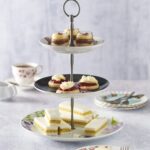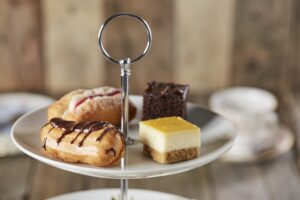The miniature elements included within an afternoon tea or ‘finger foods’ have some real benefits when it comes to different issues that can be faced by residents within a care home.
Caterers in the care sector are all too aware of dysphagia – the life-threatening medical condition, which causes sufferers to struggle with swallowing.
To allow all residents to fine together and enjoy attractive, delicious tasting foods we have utilised a variety of Country Range products to create a lovely afternoon tea suitable for those residents suffering from dysphagia.
A SOFTER APPROACH TO AFTERNOON TEA
• Country Range Ready to Serve Custard
• Country Range Plain Sponge & Pudding Mix
• Country Range UHT Dairy Whipping Cream
• Country Range Scone Mix
• Country Range Supreme Coronation Chicken Filling
• Country Range Frozen Medium White Sliced Bread
IDDSI (International Dysphagia Diet Standardisation Initiative) testing methods were used throughout recipe creation to ensure the food/liquid meets IDDSI Level 4. However, please always carry out your own IDDSI texture checks before serving any dishes to residents suffering from dysphagia.
To access the full recipe for each element of our afternoon tea please visit www.countryrange.co.uk/recipes
Making An Occasion of Tea
A good cup of tea has the power to unite us, even during the gravest of crises, such as the one we are currently experiencing. For care home residents, who are isolated from their families, it’s important to create sociable events and provide comfort and reassurance. Afternoon tea provides the perfect opportunity to gather everyone together, and your Country Range Group wholesaler
has everything you need to create it with ease.

Country Range 40 Mini Cake Assortment
Country Range Sultanas
Country Range Scone Mix
Country Range Cooked Gammon Ham
Country Range Mature White Cheddar Cheese Slices
Country Range Medium Wholemeal Sliced Bread
Benefits of Finger Food in Care
- Finger foods provide a nutritious and enjoyable alternative to plated meals
- They can be used as extra nutritious snacks for those who need them. This can be particularly useful for people who forget to eat or find coordination difficult such as with dementia or following a stroke
- Can be eaten easily without the need for cutlery and hold their form when picked up, ideal for a person who finds coordination difficult
- Encourage people to maintain their independence by enabling them to eat themselves
- For people who take a while to eat, don’t try to serve hot finger foods. Instead opt for foods which are best serve cold
- Miniature versions of foods are often better than cutting up larger items, as this creates a more stable product that is less likely to fall apart
- Many cultures provide examples of finger foods which could be adapted for older people
BY ROYAL APPOINTMENT
Not to be confused with High Tea, Afternoon Tea was introduced in England by Anna, the seventh Duchess of Bedford, in the year 1840. The Duchess often became hungry around four o’clock in the afternoon and was said to have complained of “having that sinking feeling”.
IT’S A DATE!
• Afternoon Tea Week 2020 takes place from August 10-16
• For a variation on the afternoon tea theme, why not celebrate national Cream Tea Day on June 26? You could ask some of your residents to help make the scones too
What’s Your dream Tea Party?
NAPA, the National Activity Providers Association, is giving care settings the chance to win an all-expenses paid tea party. All you need to do to enter is share your thoughts on what your dream party would involve. FOR YOUR CHANCE TO WIN a ‘Tea Party In 2020’ with all costs covered up to £500, simply complete the following statement “Our dream Tea Party would include… (in 250 words max) and email it to: project@napaactivities.co.uk, including the name of the care setting, a contact number and the name of who to contact should you win.
Closing date for entries is 1st June 2020

